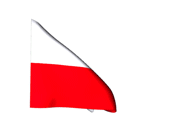Guide Poland
Poland (Polish: Polska), officially the Republic
of Poland, is a country in Central Europe. Poland
is the 9th largest Country in Europe with a
population of over 38.5 million people.Poland is the 34th most populous country
in the world, the sixth most populous member of the European Union, and the
most populous post-communist member of the European Union. Poland is a unitary
state divided into 16 administrative subdivisions.
Tourism
Poland experienced an increase in the number of
tourists after joining the European Union. Tourism in Poland
contributes to the country's overall economy and makes up a relatively large
proportion of the country's service market.
Kraków was the
former capital and a relic of Poland's
Golden Age of Renaissance. It contains the place of coronation of most Polish
kings. The city of Wrocław, designated as a European Capital of Culture in 2016,
is one of the oldest in Poland
and attracts several million tourists every year. The Poland's capital, Warsaw went through
Old Town reconstruction after its wartime
destruction and it offers a variety of attractions. Other cities include Gdańsk, Poznań, Lublin, and Toruń. There is
the historic site of the Auschwitz German concentration camp near Oświęcim.
Poland's main tourist offerings are based around
city-sightseeing and extra-urban expanses, qualified tourism, agrotourism,
mountain hiking and climbing as well as business trips. Other tourist
destinations include Poland's Baltic Sea coast in the north, Masurian Lake District and Białowieża Forest in the east, the southern Karkonosze,
Table Mountains, Tatra Mountains, in which has the highest peak of
Polish (Rysy) and the famous Orla Perć; Pieniny as well as Bieszczady Mountains in the extreme
south-east.
Sport in Poland
Football (soccer) is the
country's most popular sport, with a rich history of international competition.
Basketball, volleyball, handball, boxing, MMA, speedway, ski jumping, cross-country
skiing, ice hockey, tennis, fencing, swimming, wrestling and weightlifting are
other popular sports.
The golden era of football in Poland occurred throughout the 1970s and went on until
the early 1980s when the Polish national football team achieved their best
results in any FIFA World Cup competitions finishing 3rd place in the 1974 and 1982
editions.
The Polish men's national
volleyball team is ranked 4th in the world and the women's volleyball team is
ranked 15th. Mariusz Pudzianowski is a highly successful strongman competitor
and has won more World's Strongest Man titles than any other competitor in the
world, winning the event in 2008 for the fifth time. The first Polish Formula
One driver, Robert Kubica, has brought awareness of Formula One Racing to Poland. Poland has made
a distinctive mark in motorcycle speedway racing thanks to Tomasz Gollob, a
highly successful Polish rider. Cross country skiing and ski jumping are
popular TV sports, gathering 4–5 million viewers each competition, with Justyna
Kowalczyk and Kamil Stoch as the main attractions. The ski jumper Adam Malysz won four Olympic medals
(3 silver, 1 bronze).
Poles have significant
achievements in mountaineering, in particular, in the Himalayas,
especially in the winter gathering Eight-thousander.
The Polish mountains are an ideal
venue for hiking, climbing, skiing and mountain biking and attract millions of
tourists every year from all over the world. Baltic beaches and resorts are
popular locations for fishing, canoeing, kayaking and a broad-range of other
water-themed sports.
Wrestling in Poland
Wrestling
in Polish (as in Slovak) is called "zapasy" (greco/roman:„Styl Klasycny“ and Freestyle:
„Styl Wolny“).
The National Wrestling Federation
has its headquarter in the capital
Warsaw
and is called "Polski Zwiazek
Zapasniczy". As the first president of the federation Wladyslaw Pytlasiński was chosen in 1922 and a
well-known international Wrestling tournament is named in honour of this idol. Since 2008, Mr.
Krzysztof Klosek acts
as President of the Polish Wrestling
federation. Wrestling is traditionally anchored in
Poland
and in the past, Polish wrestlers won numerous
Olympic medals. The
National Federation is divided into 16 provincial associations
which belong to about
190 Wrestling clubs. In Poland,
both styles are
equally popular with many more
international success has been achieved
in the greco/roman style. The female wrestling is
also applied successfully.
Since November 2016 there is a
team league in Poland:
Krajowa Liga Zapaśnicza
International Situation
Because of
the intensive promotion of sport during the communist
period, Poland
has also become a strong nation in wrestling. The first World Cup title
in 1973 reached the
brothers Josef and Kazimierz
Lipień in Tehran in the greco /roman style.
Overall Polish wrestler
could win 12
World Cup titles in greco. In female
wrestling they came up with two titles but the
male freestyle wrestlers got only
6 Vice World Titles. Since the seventies to the
mid-nineties, the Polish wrestlers among the world leaders. The absolute highlight was in Atlanta
1996 where the Polish greco/roman wrestlers
won three gold
medals and also received a silver
and a bronze medal at the Olympic
Games. After this
triumph, the Polish Wrestling Federation had to wait 12 years until
Agniescza Wiesczek was able to reach an Olympic medal (Bronce) 2008
in Beijing.
Also the last World Cup title, won in 2003 by
Darius Jablonski, is now back more than a decade. As for all Central European countries, it is increasingly
difficult to keep up for Poland
in wrestling with the world's best. The Top wrestlers are mainly
from Russia, Iran, Caucasus
or East Asia. For the Olympic Games in London,
only four Polish wrestlers
could qualify. Damian
Janikowski (middleweight-greco) could win a bronze medal for Poland.
At the
Olympic Games 2016 in Rio de Janeiro,
Monika Michalik won the first Olympic medal at female Wrestling.
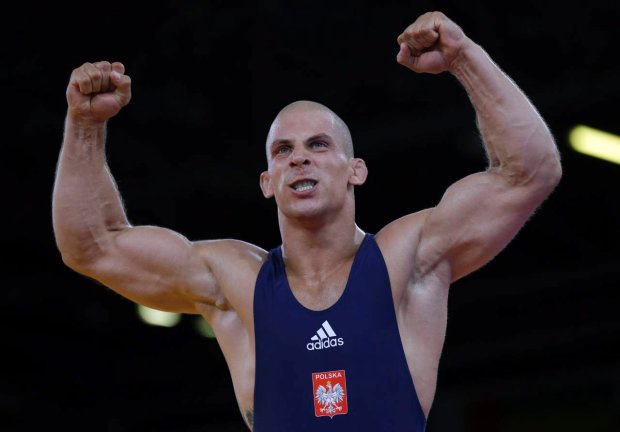 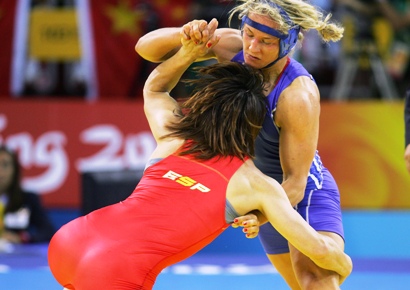
The most succesful polish wrestlers in the moment: Damian Janikowski and Agniescza Wiesczek (blue).
Most succeful wrestlers of Poland
Andrzey
Wronski (2xOlympic Champion, 1xWorldchampion,3xEuropean Champion) greco
Kazimierz
Lipien (1xOlympic Champion, 2xWorldchampion,3xEuropean
Champion) greco
Andrzey
Supron (1xWorldchampion,2xEuropean Champion) greco
Bogdan
Daras (1xOlympic Champion, 2xWorldchampion,3xEuropean Champion) greco
The
best freestyle
wrestler in Poland
was Adam Sandurski
(2,14m) in Superheavyweight
with two world runner-up titles,
and Olympic bronze in 1980 in Moscow. World Champion titles in female Wrestling
got Edyta Witkowska
and Johanna Piasecka for Poland.
As currently the
best Polish wrestler applies Damian Janikowski
from Wroclaw. He won
the bronze medal in London, 2012 he was
world runner-up and won at European Championships already silver and bronze.
Gold Medals at Olympic Games - Poland
1976 Kazimierz Lipien 62Kg greco
1988 Andrzey
Wronski 100Kg greco
1996 Andrzey
Wronski 100Kg greco
1996 Ryszard
Wolny 68Kg greco
1996 Wlodzimierz
Zawadsky 62Kg greco
National situation
The National Federation is divided into
16 provincial associations
which includes about 190 wrestling
clubs.
The best wrestling clubs in Poland:
Club Town
Slavia Ruda Slaska
Suples Krasnik
DAB Brzeznica
Grunwald Poznan
Slask Wroclaw
Zaglebie Walbrzych
AKS Bialogard
Cartusia Kartusy
Olimpijcyk Radom
AKS Piotrkow Trybunalski
Unia Raciborz
Ceramik Krotoszyn
Team competitions in Poland
Since November 2016 there is a
team league in Poland:
Krajowa Liga Zapaśnicza. The Convention on the Establishment of a Professional
Wrestling League in Poland
was signed in Warsaw
on 12 March 2015. The German “Ringer Bundesliga” served as a model. In one team
there are 9 Wrestlers (3 athletes in free-style, Greco-Roman style and female
wrestling)- they compete against each other. With following six teams, the
league started in November 2016: AKS Białogard, AKS Wrestling-Team Piotrkow Trybunalski, AZ Supra Brokers
Wroclaw, AZS-AWF Warschau, Union Racibórz und WKS Grunwald Poznan.
http://klz-zapasy.pl/
https://www.facebook.com/ligazapasnicza/
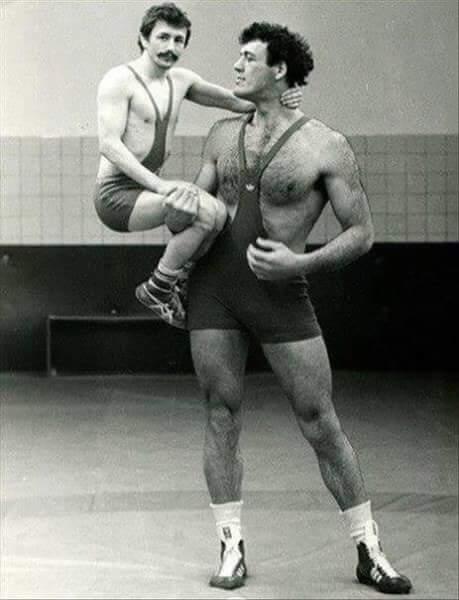
Jan Falandys (48Kg) and Adam Sandurski 2,14m and 130Kg (right).
Polish Wrestlers in Germanys
Bundesliga
After
the political changes, countless Polish wrestlers, lured came through the salaries of the Bundesliga, to Germany. The first of them were at KSV
Witten of 2.14
large Superschwergewichtler Adam Sadurski and
flyweight Jan Falandys
yet during the eighties. Both Olympic champions Wronski
and Zawadsky fought
for years in the Bundesliga. Since the nineties
there was hardly a Polish national
wrestler who did not compete in the Bundesliga.
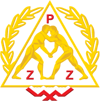
Polish Wrestling
Federation
Polski
Zwiazek Zapasniczy
ul. Żelazna
67 m. 73
00-871 Warszawa
Polska
tel./fax.
+48 (22) 624 81 11
+48 (22) 624 01 69
+48 (22) 652 19 03
Homepage: Polish Wrestling Federation
http://www.zapasy.org.pl/
Wrestling Clubs in Poland: http://www.zapasy.org.pl/strefa_zwiazku/kluby_zapasnicze.html
11 / 2016
|
